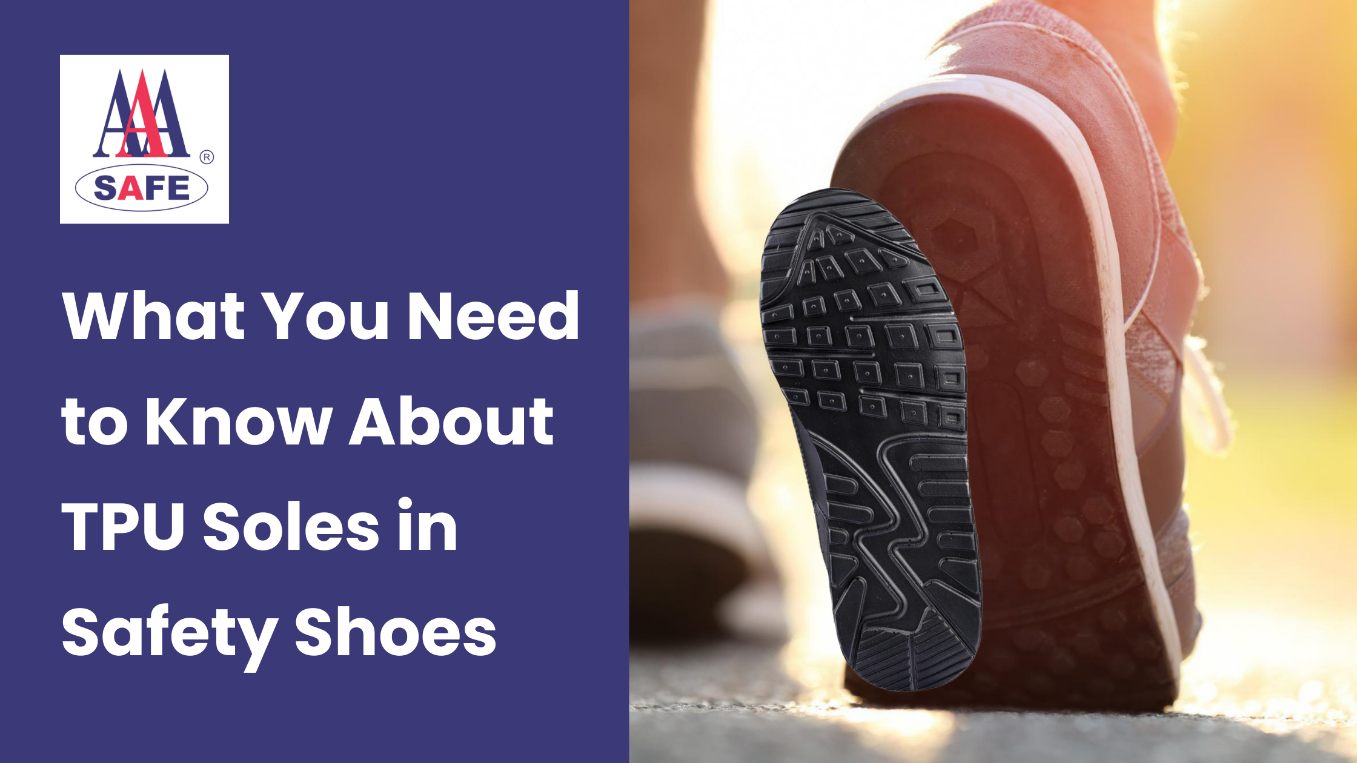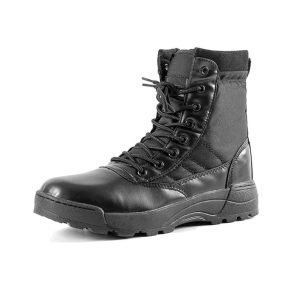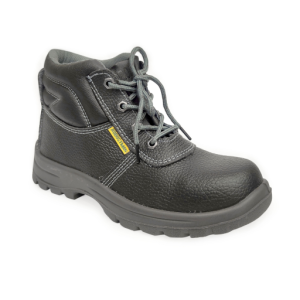In the world of safety footwear, choosing the right sole material is crucial for ensuring comfort, durability, and protection. Thermoplastic Polyurethane (TPU) has become a popular material in safety shoe soles, known for its unique mix of resilience, flexibility, and slip resistance. This guide will explore everything you need to know about TPU soles in safety shoes, covering key benefits, applications, limitations, and maintenance tips to make the best choice for workplace safety.
What is Thermoplastic Polyurethane (TPU)?
Thermoplastic Polyurethane, commonly known as TPU, is a versatile polymer that combines properties of rubber and plastic, giving it a unique structure that offers durability without compromising on flexibility. Originally used in athletic shoes and industrial applications, TPU’s qualities make it ideal for safety footwear, where both performance and resilience are critical.
Key Properties of TPU Soles in Safety Shoes
Property | Description |
Lightweight | TPU’s lightweight nature helps reduce foot fatigue. |
Elasticity | Offers high flexibility and comfort. |
Abrasion Resistance | Resists wear and tear, extending shoe life. |
Slip Resistance | Ensures good traction on slippery surfaces. |
Durability | Long-lasting, especially under demanding conditions. |
Why TPU Soles are Preferred in Safety Shoes
1. Enhanced Comfort and Flexibility
TPU soles are known for their elasticity and flexibility, essential factors in comfort:
- Adaptive Movement: TPU adapts to foot movement, providing a natural range of motion.
- Cushioning Effect: The material’s cushioning makes it ideal for prolonged use, especially for workers on their feet all day.
- Temperature Resilience: TPU maintains flexibility across a range of temperatures, making it suitable for various climates.
2. Superior Durability and Wear Resistance
Durability is critical in safety footwear, as shoes often face abrasive environments. TPU soles stand out due to:
- Abrasion Resistance: They endure tough surfaces, extending the overall lifespan of the shoe.
- Long-term Stability: TPU maintains its properties over time, ensuring consistent performance in demanding conditions.
- Resistance to Splitting: TPU soles resist splitting or cracking, common issues with other materials like rubber.
Why TPU Soles Provide Optimal Slip Resistance
Safety is a top priority in work environments, and TPU’s slip-resistant properties provide confidence on various surfaces:
- Traction in Wet or Oily Conditions: TPU soles offer excellent grip even in slippery areas, reducing accident risks.
- Enhanced Tread Design: Many TPU-soled shoes have optimized tread patterns for maximum stability.
- Improvement with Wear: TPU often becomes more slip-resistant over time, unlike other materials that wear down faster.
Chemical and Oil Resistance
In industrial settings, exposure to chemicals and oils can compromise footwear. TPU’s resistance to these substances adds to its suitability:
- Oil Resistance: TPU soles maintain their integrity in oil-rich environments, perfect for automotive and industrial use.
- Chemical Resilience: TPU can withstand certain acids and alkalis, safeguarding feet from potential spills.
- Protection in High-Risk Environments: This resistance reduces the need for frequent replacements, saving costs over time.
TPU Soles vs. Other Safety Shoe Soles: A Comparative Analysis
Understanding TPU’s benefits is easier when comparing it to other common materials like rubber and PU (Polyurethane):
Feature | TPU | Rubber | PU (Polyurethane) |
Weight | Lightweight | Heavier | Lightweight |
Flexibility | High | Moderate | High |
Durability | High | High | Moderate |
Slip Resistance | Good | Excellent | Good |
Heat Resistance | Moderate (up to 110°C) | High (up to 300°C) | Moderate |
Cost | Moderate | Higher | Lower |
TPU vs. Rubber: Rubber offers superior heat resistance, making it ideal for high-temperature settings, while TPU is more suitable for environments where flexibility and lightweight are priorities.
TPU vs. PU (Polyurethane): PU is commonly used due to its lightweight and affordability but lacks the durability and slip resistance that TPU provides.
Real-World Applications of TPU Soles in Safety Shoes
TPU’s versatility makes it suitable for various industries and applications:
- Construction Sites: TPU soles offer stability and comfort on uneven ground, making them an ideal choice.
- Manufacturing Plants: Chemical resistance and durability cater to the demands of manufacturing environments.
- Warehouses: TPU’s lightweight structure reduces fatigue for warehouse workers who spend long hours on their feet.
- Automotive Industry: Oil resistance is essential in this field, making TPU soles highly suitable.
- General Industrial Use: TPU’s adaptability allows for a wide range of applications across industries.
Limitations of TPU Soles
While TPU soles offer numerous benefits, it’s essential to understand their limitations to make an informed choice:
- Heat Resistance: TPU soles are not ideal for high-temperature environments above 110°C. Industries requiring extreme heat protection should consider alternatives like rubber.
- Higher Cost: TPU soles generally come at a higher cost than traditional PU soles, though the durability often compensates for this.
- Limited Electrical Hazard Protection: TPU may not provide the necessary insulation for electrical work. In these cases, soles with electrical hazard protection are preferred.
Maintenance and Care of TPU Soles
To maximize the lifespan of your TPU-soled safety shoes, proper care is essential:
- Regular Cleaning: Clean TPU soles with mild soap and water to prevent the buildup of dirt and chemicals.
- Avoid Extreme Heat Exposure: Keep TPU shoes away from prolonged heat to prevent material degradation.
- Store Properly: Store in a cool, dry place to maintain TPU’s properties.
- Inspect for Wear: Regularly check for signs of wear, especially in high-stress areas like the heel and toe.
Environmental Benefits of TPU Soles
Sustainability is becoming a focus in industrial footwear, and TPU soles have environmental advantages:
- Potential Recyclability: Depending on formulation, TPU can be recycled, contributing to less waste.
- Durability Reduces Replacement Needs: TPU’s extended lifespan means fewer replacements, reducing waste.
- Development of Eco-Friendly Formulations: Manufacturers are creating eco-conscious TPU varieties, supporting sustainability in safety footwear.
Future of TPU Soles in Safety Shoes
Innovation continues in TPU technology, with manufacturers focusing on improving eco-friendliness and enhancing the comfort of TPU soles. In the coming years, TPU soles in safety shoes may become even lighter, more resilient, and adaptable to various workplace requirements. As work environments continue evolving, so will the design of TPU-soled safety shoes, with additional features tailored for user safety and comfort.















